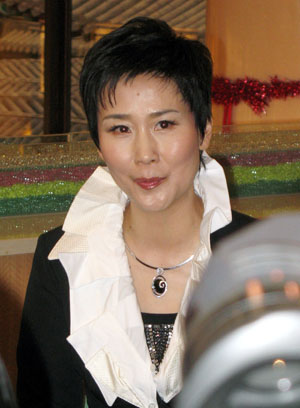
Li Xiaolin is a member of the National Committee of the Chinese People's Political Consultative Conference (CPPCC). Smartly attired, Ms. Li gave off the vibe of a successful businesswoman as she sat in the lounge of the Yanxiang Hotel.
She is the 47-year-old daughter of Li Peng – the former premier – who was a visiting scholar at MIT. Currently Ms. Li is the CEO of China Power International Development Ltd.
She mentioned that her father is currently in good health. "He is now compiling his diaries and wants to get them published in the near future," Ms. Li divulged.
During the conference Ms. Li has suggested streamlining the energy industry and adopting a coal-electricity integration system.
"I have been working in this industry for more than 20 years. In our country, coal-fired plants supply the bulk of China's electric power. My experience tells me that we should embrace a safe, recyclable energy system."
Despite obstacles, ranging from bureaucracy snafus to manufacturing bottlenecks, the company has shut off 43 thermal power units that generated 2.29 million kilowatts of electricity to evolve into a more environmentally friendly industry.
In China 11 nuclear plants account for less than two percent of the total power supply. Ms. Li asserted that China Power would be a significant player in the nuclear power market.
"We have invested in domestic nuclear plants. For the next generation, it is clear to me that we should resort to clean energy," she added. The company has engaged in new energy business in Hong Kong.
"I have been to Japan. Their advanced technology in new energy impressed me a lot. I indeed hope we can cooperate with Japan in this field," she said.
Recently, her company has worked out a plan to take a bite in Hong Kong's power market, but it is yet to be approved by the local government.
The company's new plan for this year involves a string of acquisitions and mergers to help the company keep the upper hand in this competitive field. It will also seize any opportunity to participate in the international market.
China Power has gone public in the Hong Kong stock market. Ms. Li said as a Chinese government company her enterprise would consider returning to the mainland stock market when it measures up to requirements.
In the past year, surging coal prices have bedeviled the giant power company and shaved away at its profits. "As we all know, coal is king in this industry. Pinched by soaring costs, we have improved our profitability and efficiency in a bid to offset the cost increases," she explained.
At the end of last year, heavy freak snowstorms knocked out electricity and water supplies and threatened coal supplies that fuel the country's power plants. She said that the government is now grappling with the need to establish a strategic energy mechanism and a better disaster emergency response system.
As a female member, Ms. Li urged the government to give women and children greater access to the benefits of economic growth by establishing a comprehensive social security system.
(China.org.cn by staff reporter He Shan, March 5, 2008)